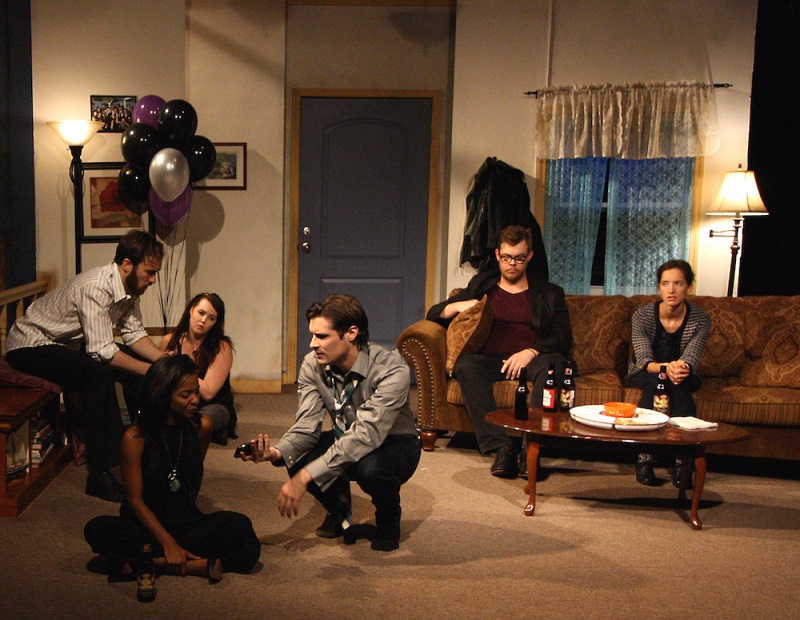
In the opening minutes of Lindsay Joy's In the Event of My Death, directed in its current world premiere by Padraic Lillis, Peter (John Racioppo) and his friend Amber (Lisa Jill Anderson) clean the trash from the living room of his house, which once belonged to his parents, in preparation for a post-funeral gathering to commemorate Freddy, another friend, who has committed suicide. Unfortunately for them, the past, and its hold on the present, will not be so easy to tidy away; in fact, from then on, events will get far messier. In Peter's suburban Pennsylvania residence, as a small group of Freddy's friends and relatives struggle with death in the Facebook age, death at its most unexpected, and death as a deliberate choice, as well as the knowledge that "it gets better" didn't happen for Freddy, their coming together leads them into a much wider emotional archaeology, seemingly a current strong suit of Stable Cable Lab Co.
The emotional untidiness kicks off with the question of why prom queen Becky (Samantha Strelitz), who literally made Freddy eat shit in high school, has been invited. As the level of Jameson in the bottle lowers, the level of hostility on display rises, and as more guests arrive, the easy narratives become more tangled and their protective obfuscations are increasingly stripped away. Making up the rest of the group by the second act are Meg (Lillith Fallon) and Kate (Kara Young), Freddy's adoptive and biological sisters, respectively; Brianna (Breanna Foister), a colleague whose relationship with Freddy went beyond work; Conner (Ian Poake), the geek of the circle and Freddy's erstwhile clubbing companion; and Trevor (Cory Kosel), Freddy's roommate and the person to find his body. Freddy's death means that various conversations about the necessity of letting go always operate with multiple valences. The play considers how people move on not just from death but in life, and how they change in doing so. At one point, Trevor says, "No one should have to be saddled with who they were." At another point, Becky angrily criticizes the group's reminiscences about "forever ago" and points out that nostalgia is not knowing, that there was a now-Freddy about whom stories aren't being told. Yet the past has also created the relationships that bring these particular people to this particular house, and, one could argue, it has created the present versions of the people themselves. Of course, there is also the question of how much anyone allows others to know, and how that changes from person to person, especially when the issues may not only be friends drifting apart in their mid-twenties but also one of those friends trying, as Freddy was, to navigate being a gay man who was adopted by a conservative, religious family and is frightened to come out to even his oldest friends or his twin sister. Freddy's dilemmas regarding choices for his life are echoed by the situations of other characters, whether it is laziness for them to choose pragmatism over dreams, whether it is destructive to take the easier rather than the harder path.
One of the thing that Lindsay Joy's play does very well while considering these questions is to subvert or complicate, as it goes on, some of the expectations and types that it sets up (the guy squandering his potential in his hometown; the cool, snarky friend; the uncool, buzzkill girlfriend). The set includes a back porch, while the kitchen, to which characters frequently summon one another, is off-stage, which allows some interesting juxtapositions of character groupings and action presented and implied. These developments keep the audience invested in these characters, as do strong performances by the entire cast. The actors, and Lillis' direction, convincingly, and often movingly, establish the chemistry, rhythm, and dynamics of a group of (mostly) friends with an extensive shared past. (Perhaps this sense of existing intimacy is bolstered by the fact that Poake and Foister are returning from Stable Cable's Live from the Surface of the Moon and Anderson from both that show and the company's subsequent Because Me). In particular, Kara Young as Kate packs a great deal of intensity and complexity into her time onstage, especially given that she doesn't show up until the intermission break. Anderson's Amber is the delightful, fucked-up friend who serves as the group's id, and Samantha Strelitz does magnificent work layering our initial impressions of Becky. Cory Kosel skillfully communicates Trevor's charm, hurt, love, and confusion as he opens up about what Freddy's life and death meant to him. Trevor is the heart of the play in both senses of the word, and Kosel meets that challenge effortlessly.
It is not surprising that a play centered on a suicide touches on heavy topics, including regret, forgiveness, depression, and homophobia, but In the Event of My Death keeps the touch light and deft, consistently making the audience laugh out loud without losing its emotional heft. The production weaves the different embodiments of its themes together in an entertaining, satisfying theatrical experience, a memorable snapshot of intertwined lives in transition. To this gathering, RSVP yes. - Leah Richards & John Ziegler
